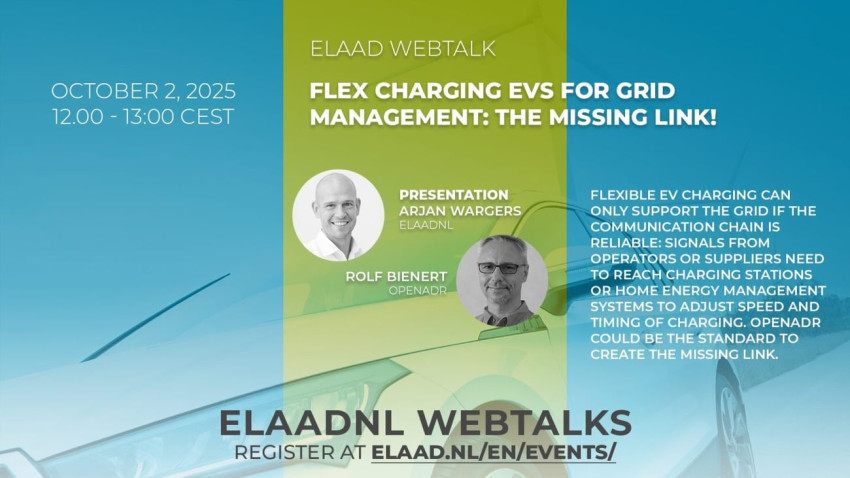
ElaadNL: Webtalk #79 Flex Charging EVs for grid management: The Missing Link

De ontbrekende schakel in slim laden: OpenADR
Wil je flexibel laden van elektrische auto’s inzetten voor netbeheer? Dan is een betrouwbare communicatieketen essentieel.
Berichten moeten soepel van netbeheerder of energieleverancier naar laadpunten of Home Energy Management Systems (HEMS) kunnen reizen om laadsnelheid of -moment automatisch aan te passen.
Daarin is OpenADR mogelijk dé ontbrekende schakel in de keten. Maar wat is het precies?
Hoe werkt het? En waarom heeft Nederland juist deze standaard gekozen voor de aansturing van publieke laadpunten bij netcongestie?
In deze presentatie nemen Arjan Wargers en Rolf Bienert je in vogelvlucht mee door de achtergrond en toepassing van OpenADR — een protocol dat nu nog relatief onbekend is, maar straks onmisbaar wordt in de uitrol van slim en netbewust laden.
De webtalk wordt in het Engels gehouden.
"Elaad Webtalk #79: Flex charging EVs for grid management: the missing link!".
Presentations by Rolf Bienert (OpenADR) and Arjan Wargers (ElaadNL)
If you want to deploy flexible charging of electric cars for grid management you need a working communication chain. Messages must travel form grid operator or energy supplier to EV-charging stations or Home Energy Management Systems (HEMS) to adjust the speed or timing of charging. A communication standard, Open ADR, could be the missing link! But what is it, how does it work and and why was it chosen in the Netherlands to control public charging stations for grid management and congestion prevention?
This presentation is a brief introduction in this for many not yet well known protocol that will soon be crucial in the roll out of smart and grid aware charging
About OpenADR
OpenADR stands for Open Automated Demand Response and is an internationally recognized communications standard for automating demand response (DR) in the electricity grid. It provides a standardized, open, secure, and two-way communication model that allows energy companies, grid operators, and customers to exchange dynamic price and reliability signals. This enables energy users, such as those in electric vehicle charging networks, to automatically adjust their energy consumption based on real-time grid information, improving grid efficiency and helping to balance supply and demand.
This presentation is a brief introduction in this for many not yet well known protocol that will soon be crucial in the roll out of smart and grid aware charging
Terugkijken opname (recording)
U kunt tijdens de Webtalk al uw vragen over dit onderwerp stellen. Heeft u al een dringende vraag of wilt u meer informatie, stuur dan een e-mail naar ElaadNL (info@elaad.nl).
Recording: Flex charging EVs for grid management the missing link!